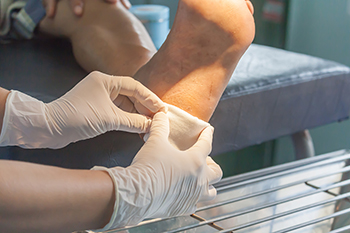Causes and Symptoms of Infected Foot Wounds
Tuesday, 18 June 2024 00:00
Infected foot wounds often arise from cuts, scrapes, or punctures that become contaminated with bacteria. Common causes include stepping on a sharp object, improper wound care, and existing medical conditions like diabetes that impair healing. Symptoms of an infected foot wound can vary but typically include increased pain, redness, and swelling around the wound site. The area may feel warm to the touch, and pus or other drainage may be present. More severe infections can lead to fever, chills, and swollen lymph nodes. It is essential to recognize these signs early and seek medical attention promptly to prevent the infection from spreading. Proper wound care, including cleaning, applying antiseptics, and covering with sterile dressings, plays a critical role in combating infections and promoting healing. If you have a wound on your foot, it is strongly suggested that you are under the care of a podiatrist who can effectively treat various types of foot wounds.
Wound care is an important part in dealing with diabetes. If you have diabetes and a foot wound or would like more information about wound care for diabetics, consult with one of our podiatrists from Central Ohio Comprehensive Foot Care. Our doctors will assess your condition and provide you with quality foot and ankle treatment.
What Is Wound Care?
Wound care is the practice of taking proper care of a wound. This can range from the smallest to the largest of wounds. While everyone can benefit from proper wound care, it is much more important for diabetics. Diabetics often suffer from poor blood circulation which causes wounds to heal much slower than they would in a non-diabetic.
What Is the Importance of Wound Care?
While it may not seem apparent with small ulcers on the foot, for diabetics, any size ulcer can become infected. Diabetics often also suffer from neuropathy, or nerve loss. This means they might not even feel when they have an ulcer on their foot. If the wound becomes severely infected, amputation may be necessary. Therefore, it is of the upmost importance to properly care for any and all foot wounds.
How to Care for Wounds
The best way to care for foot wounds is to prevent them. For diabetics, this means daily inspections of the feet for any signs of abnormalities or ulcers. It is also recommended to see a podiatrist several times a year for a foot inspection. If you do have an ulcer, run the wound under water to clear dirt from the wound; then apply antibiotic ointment to the wound and cover with a bandage. Bandages should be changed daily and keeping pressure off the wound is smart. It is advised to see a podiatrist, who can keep an eye on it.
If you have any questions, please feel free to contact one of our offices located in Delaware and Westerville, OH . We offer the newest diagnostic and treatment technologies for all your foot care needs.








